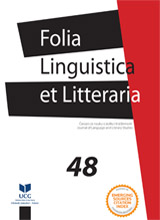TO WALK IS/NOT TO WRITE: THE PERCEPTION OF WALKING IN TWO PERSONAL ESSAYS BY MAX BEERBOHM AND VIRGINIA WOOLF
TO WALK IS/NOT TO WRITE: THE PERCEPTION OF WALKING IN TWO PERSONAL ESSAYS BY MAX BEERBOHM AND VIRGINIA WOOLF
Author(s): Nina SirkovićSubject(s): Language and Literature Studies, Studies of Literature, Sociology of Literature
Published by: Filološki fakultet, Nikšić
Keywords: personal essay; walking; subjectivity; freedom; flâneury; stream of consciousness
Summary/Abstract: The paper deals with the relationship between the personal essay as a form and walking as an impulse for artistic creation. After the place of the personal essay within the literary genre is considered (Adorno, Peter, Huxley, Epstein, Boetcher Joeres, Mittman, Lopate), the idea of walking for its own sake is compared with writing the personal essay. A walk can be a means of processing thoughts, evoking memories, developing associations and ideas which arise spontaneously along the way. Going for a walk implies no specific direction, so the essayist has a mental freedom to express personal experience wandering in various directions, since there is no drawn path in advance. The different perceptions and viewpoints of walking are analysed in two personal essays “Going Out for a Walk” by Max Beerbohm and Virginia Woolf’s “Street Haunting”.
Journal: Folia Linguistica et Litteraria
- Issue Year: 2024
- Issue No: 48
- Page Range: 27-40
- Page Count: 14
- Language: English

